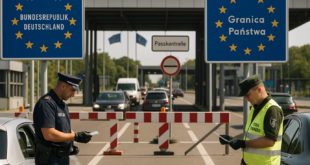To facilitate the entry of labour migrants into the European Union, the EU Parliament has eased the rules governing the issuance of the Blue Card, which gives highly-skilled workers from outside the EU the right to live and work in any EU country with the exception of Denmark and Ireland.
The Parliamentarians adopted the reform of the Blue Card scheme on Wednesday to make it easier for companies to hire workers from non-EU countries.
The features of the Blue Card reform, designed to promote legal labour migration to the EU, are:
- Blue Card applicants can now present a valid work contract of at least six months instead of the current 12.
- Lower threshold for the minimum salary that applicants must earn in order to qualify. Until now, workers from outside the EU had to earn at least one and a half times as much as the average in the EU state they wanted to come to be issued the Blue Card. In future, it only has to be the same.
- Blue Card holders will be able to move more easily to another EU country one year after working in the country in which they first settled. Their family will be able to accompany them.
- Refugees and asylum-seekers who currently live in the EU can apply for a Blue Card in other EU countries and not just where they reside, as was the rule until now.
The Blue Card was introduced about ten years ago by the EU to facilitate the employment of highly-qualified people from third countries to address the labour shortage in certain sectors, such as IT, engineering and health care. So far, however, the scheme has attracted too few migrants, according to the Parliament, which is why it has now lowered the hurdles.
In 2019, 36,806 cards were issued across the EU (28,858 of them in Germany).
“We must do everything we can to improve legal migration to Europe,” said lead MEP Javier Moreno Sánchez (Spain, Socialist Group): “In the future, we want to go even further so that workers in medium and low-paid jobs can also make as positive a contribution to our society as Blue Card holders do now.”
EU member states still have to agree to the new rules. After entering into force, member states have two years to transpose them into national law.
Vivian Asamoah
 THE AFRICAN COURIER. Reporting Africa and its Diaspora! The African Courier is an international magazine published in Germany to report on Africa and the Diaspora African experience. The first issue of the bimonthly magazine appeared on the newsstands on 15 February 1998. The African Courier is a communication forum for European-African political, economic and cultural exchanges, and a voice for Africa in Europe.
THE AFRICAN COURIER. Reporting Africa and its Diaspora! The African Courier is an international magazine published in Germany to report on Africa and the Diaspora African experience. The first issue of the bimonthly magazine appeared on the newsstands on 15 February 1998. The African Courier is a communication forum for European-African political, economic and cultural exchanges, and a voice for Africa in Europe.
































